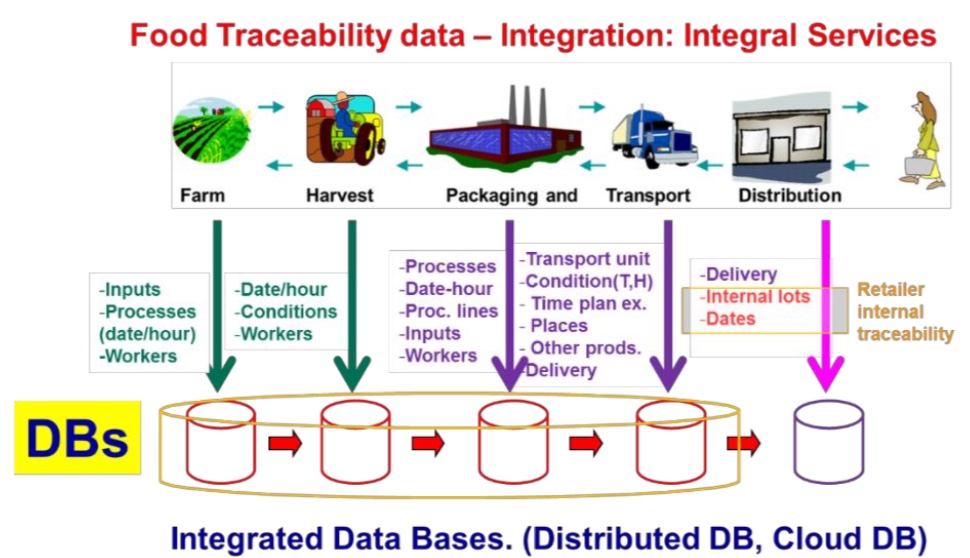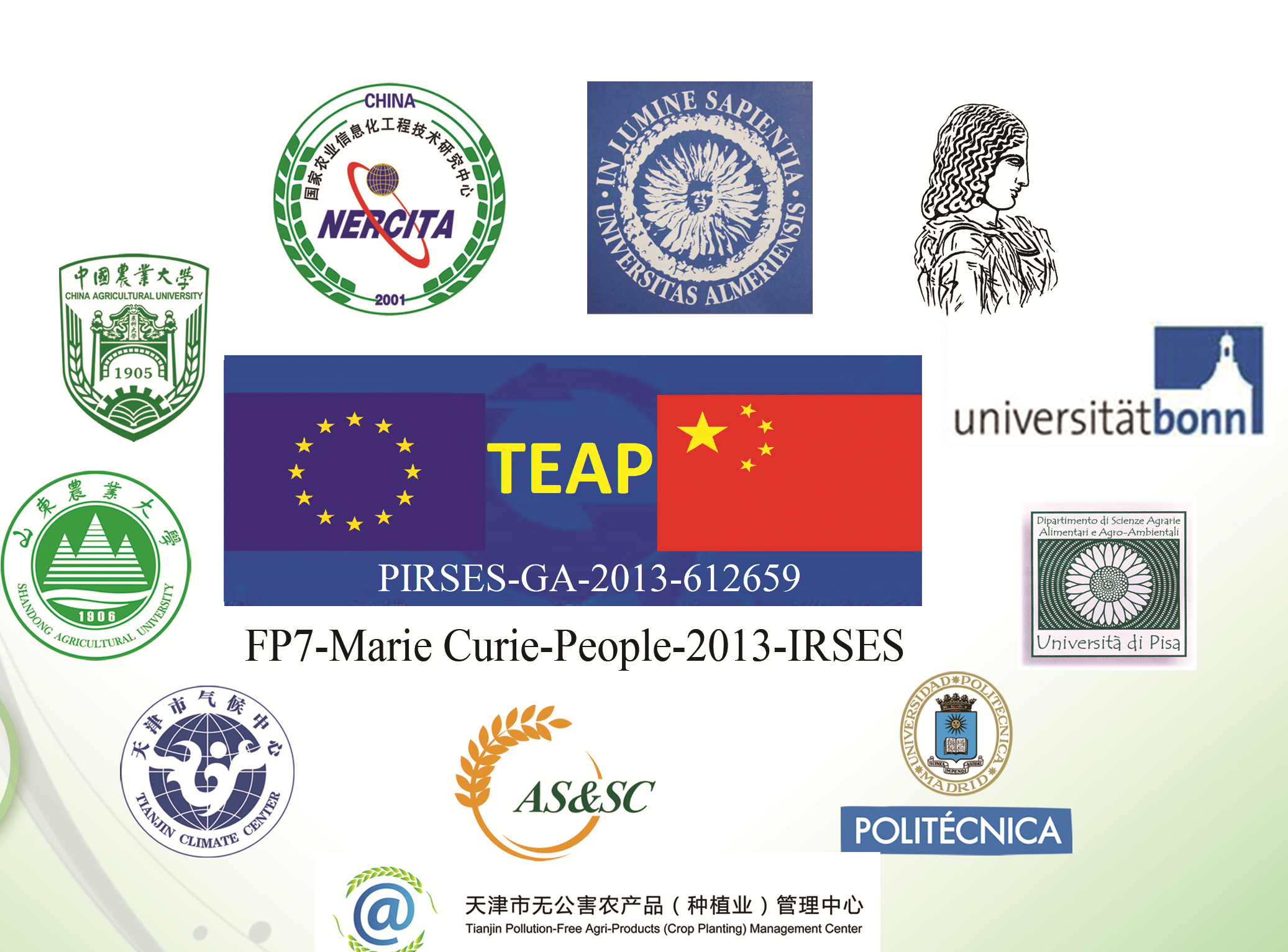- Inicio
- Universidad
- Servicios Generales
- (Nombre)
TEAP Project >> Marie Curie Actions, PIRSES-GA-2013-612659

A Traceability and Early warning system for supply chain of Agricultural Product: complementarities between EU & China
The main objective of the TEAP project was to obtain a better mutual understanding of the state and the possible roadways of agricultural product quality and safety in both the European Union and China, and deepen into the knowledge and the technologies that assure the following ultimate objectives. This objective have been reached as the team has been fortified in the sense of developing a working cluster that we hope it is going to remain after the project, preparing now Research Projects, for the European Horizon2020, the National Programs and the Bilateral Programs. We must point the reinforcement of the links between the different partners and the contacts established along the development of the project with a total of 47 organization and companies related with the food traceability, safety, production, certification and management, plus several small farmers.
All the different working areas have been addressed, obtaining the proposed results:
-
Good Agricultural Practices and Quality Standards for production planning. We have analyzed the different standards in Europe (mainly GlobalGAP and Integrated Production) and China (ChinaGAP), trying to align them. It is a future proposal to work together in this area, as ChinaGAP is evolving (it was a draft).
-
Optimum techniques of Soil, fertilizer, water management and pest warning models and systems for Integrated Production, including in this area the knowledge about (local) pathogens management. We have compared mainly the irrigation systems in both areas (EU, Greece, Italy and Spain, China, SDAU, CAU, TJCC and NERCITA) for horticultural and fruit production. We have analyze the applicability of the biologic control methods in the case of China. Phenotyping have been selected too as a key issue for early decease warning, with a strong collaboration between (UE – Germany, and China, NERCITA and CAU).
-
HACCP software in the fresh agri-product logistics for quality safety control. Some practical experiments have been developed in common about the logistic cold chain, mainly between EU- Spain and China- NERCITA. Main results are included in the already finished PhD. by Dr. Badia-Melis.
-
Traceability systems for the supply chain of agricultural products “seed-to-plate”. We have developed a general model of the traceability process all along the product chain, all the partners have participated in this work, from production to distribution. We have proposed how to improve the supply chain to avoid fraud and improve safety by the intensive use of ICT. We offer an example about exports of Dolmades from China to EU.
The team of TEAP has obtained a common knowledge about these four areas for both territories (EU and China), being able to transfer this knowledge to the companies and public bodies in both areas. We are ready to use this knowledge with other possible partners for further developments, possible training and transfer to the social agents. We propose an active and integrated traceability system, using the IoT and Big Data technologies (see fig.). The system must be able to find problems before any crisis affecting the customers.
We have detected some interesting areas to continue collaboration, including other partners, these are:
-
GAP @ ChinaGap changed recently (2017); it is needed to update the recommendations because Food Safety is becoming more important every year. It is a very important subject to align the different quality standards in order to facilitate the world trade.
-
Market has changed during the project, it is required to include E-Commerce, we need to examine and recommend Traceability and Safety measures for E-Commerce (area not included in the original project).

-
New advances in IOT for traceability have developed during the last period of TEAP and we need more cooperation in this area between EU and China partners. This area will be the subject of a future joint project.
-
Phenotyping is becoming more important every day as we have reported-D-3.2, its relation to Early Disease detection. We plan to develop a Scientific Network about Phenotyping between EU and China. It can be an extension of the existing EU network to China for all the sustainability benefits that can be incurred for EU and CHINA and probably for other developing countries, a meeting is arranged about this area in September 2018 (out of the project).
-
We have visited multiple companies in both EU and China and we propose to develop, beyond the TEAP deliverables, some traceability study cases, including teaching and demo materials, which could be used for teaching and demonstration. Later extension of the results is really important.
Along the development of the project we have had exchanged ideas, proposing a total of four projects to the Horizon2020 calls and developing new proposals and ideas in the area of food safety, traceability and security. We have developed some materials in this subject for both areas that can be exchanged with other groups interested. We are open to collaboration with other partners in both sides. We have proposed too seven bilateral projects and three national projects with participation of partners of both areas, EU and China.
We have completed a total of 260 secondmends totalizing 154.97 man-month, with a high participation of experienced researchers, due to the fact that our objective was build a collaboration network oriented to the development of research projects on the long term.
We have published 20 paper in peer-review journals (15 JCR). We have presented results in 21 conferences (provisional numbers). Some common experiments have been part of two PhD thesis finished successfully, and we are involved in four more PhD thesis and five Master thesis under bilateral direction.
We have implemented 9 workshops and 3 training courses. These have a great social impact, as some of the workshops and all the training courses have been attended by technical staff and farmers. We have had social impact in training technicians, managers and farmers in the different technologies (as intelligent irrigation, traceability, certification or market requirements, as social and gender equality, as we contacted with the Beijing Women Association and involved as may female researchers as possible, (50% of the PhDs on way).









